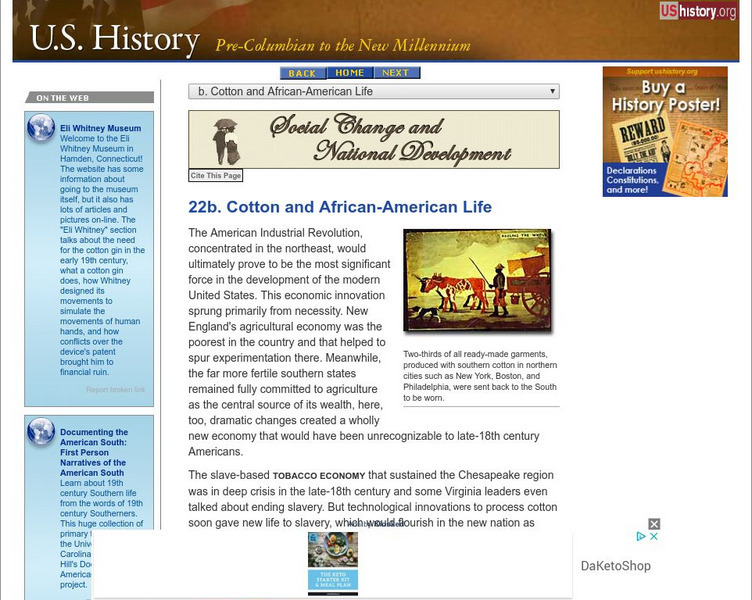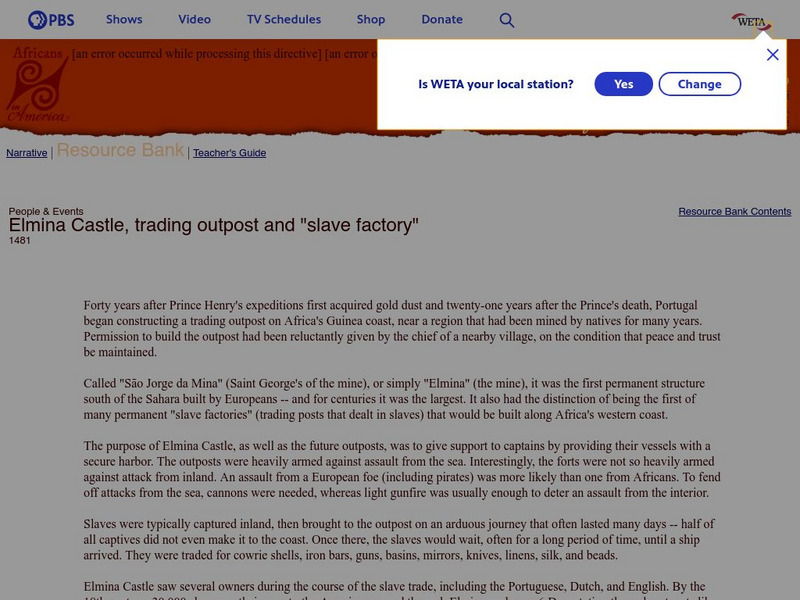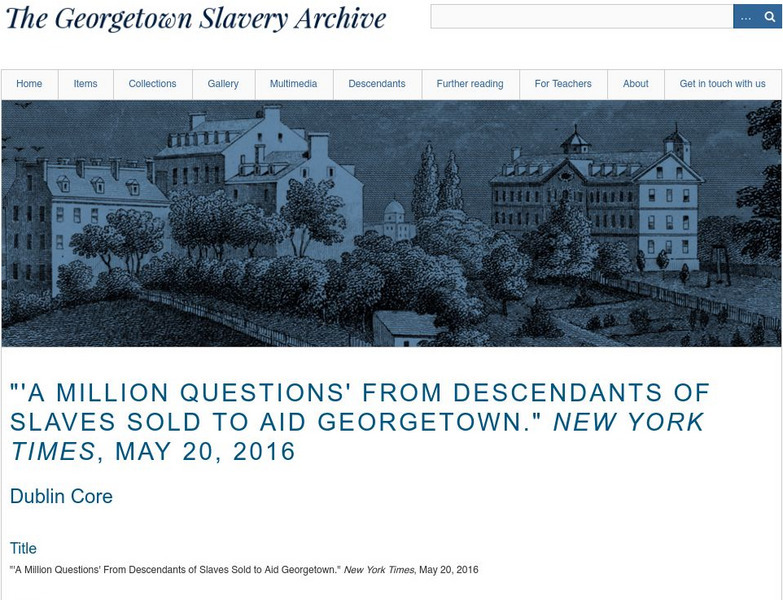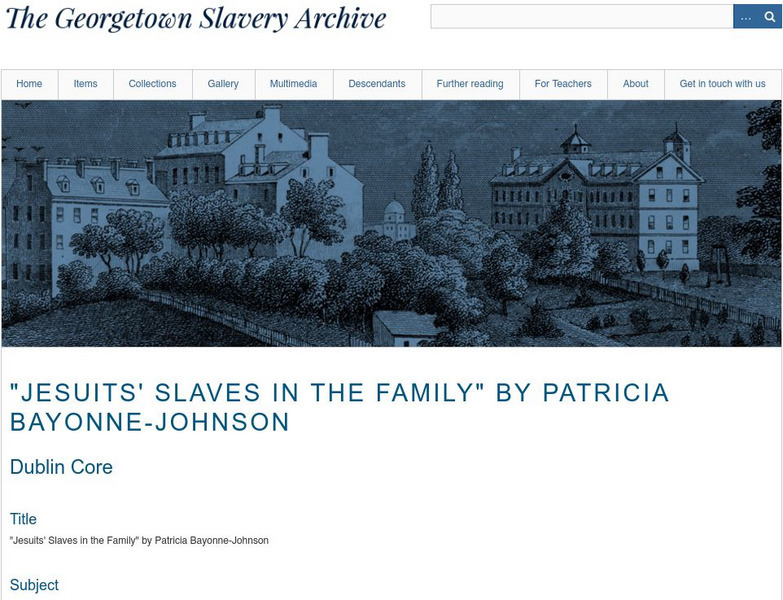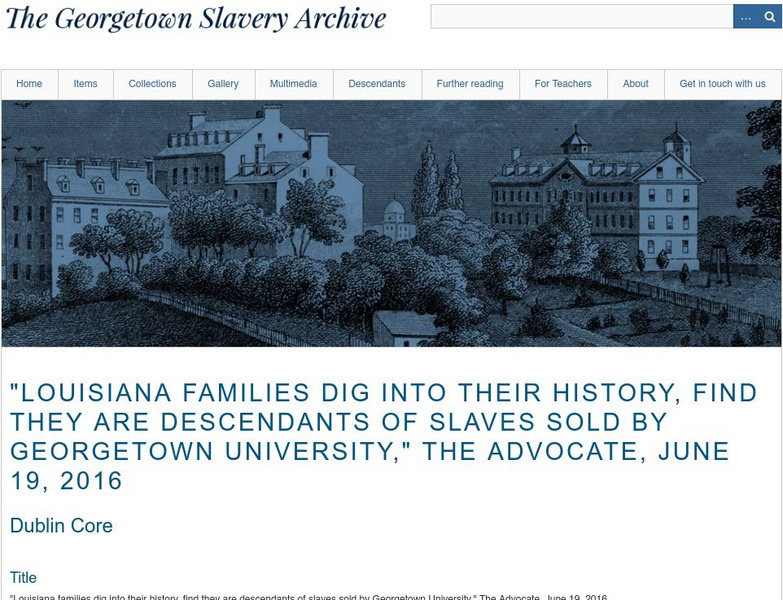National Museums Liverpool
National Museums Liverpool: International Slavery Museum: The Trade Triangle
Explore the history of the slave trade.
The History Cat
The History Cat: Slavery in America
Discusses the growth of the slave trade to America, the experiences of slaves, the difference between indentured service and slavery, and how slaves were bought and sold at auction. Describes the lives of slaves, their homes, the...
Independence Hall Association
U.s. History: Cotton and African American Life
But for the invention of the cotton gin, slavery perhaps would have died out in the United States in the early 19th century. Read about why technological advances caused the spread of slavery in the South and read about how slaves clung...
PBS
Pbs: Elmina Castle, Trading Outpost and "Slave Factory"
Find out about "slave factories," built along Africa's western coast.
Columbia University
Columbia University: Columbia University & Slavery 4.watts, Crugers, and Others
This website was created by faculty, students, and staff to publicly present information about Columbia's historical connections to the institution of slavery. This article looks at slave owners and traders who had connections to King's...
Columbia University
Columbia University: Columbia University & Slavery 3. The Livingstons
This website was created by faculty, students, and staff to publicly present information about Columbia's historical connections to the institution of slavery. This article looks at the depth of the connections of King's families with...
Columbia University
Columbia University: Columbia University & Slavery 1. King's College and Slavery
This website was created by faculty, students, and staff to publicly present information about Columbia's historical connections to the institution of slavery. This article discusses King's College, Columbia's direct predecessor, and its...
Georgetown University
Georgetown: Georgetown Slavery Archive "Meet the Gu272" Data Visualization
"Meet the GU272: a digital exploration of Georgetown's history of slavery" is a website designed by Sabrina Ma (GU '18) and Jonathan Gibson (GU'19). Meet the GU272 provides a set of preliminary digital visualizations of information about...
Georgetown University
Georgetown: Georgetown Slavery Archive Timeline of the 1838 Sale
A web-based timeline graphic of the Maryland Jesuits' sale of the people they owned. This timeline spans a half-century, from the first discussions among the Maryland Catholic clergy about selling their human property in 1813 to the...
Georgetown University
Georgetown: Georgetown Slavery Archive Paul Rochford, "Louisa Mahoney Mason"
This essay traces the life of Louisa Mahoney Mason and her family. Louisa Mahoney Mason was a member of the Maryland Jesuit enslaved community; she remained in Maryland after the 1838 sale. She and her children were the last people held...
Georgetown University
Georgetown: Georgetown Slavery Archive a Million Questions' From Descendants
New York Times reporters Rachel Swarns and Sona Patel profile several descendants of people sold by Georgetown President Thomas Mulledy SJ in 1838.
Georgetown University
Georgetown: Georgetown Slavery Archive "Crump: It's Been There All Our Lives"
Hoya reporter Kshithij Shrinath interviews Maxine Crump, a descendant of Cornelius Hawkins, who was sold by Georgetown President Thomas Mulledy SJ in 1838.
Georgetown University
Georgetown: Georgetown Slavery Archive Bayonne Johnson
Hoya reporter Kshithij Shrinath interviews Patricia Bayonne-Johnson, a descendant of Nace and Biby Butler a husband and wife who were sold by Georgetown President Thomas Mulledy SJ in 1838. Ms. Bayonne-Johnson was the first person to...
Georgetown University
Georgetown: Georgetown Slavery Archive "Jesuit Slaves in the Family"
Patricia Bayonne-Johnson's account of her discovery that the Jesuits of the Maryland Province owned her great-great-grandparents Nace and Biby Butler and sold them to Louisiana.
Georgetown University
Georgetown: Georgetown Slavery Archive Louisiana Families Dig Into Their History
This article in the Baton Rouge Advocate focuses on descendants of slaves and their research into their family histories.
Georgetown University
Georgetown: Georgetown Slavery Archive I Know That My Bennett Ancestors
Chapter two of Louis Diggs, Surviving in America: Histories of 7 Black Communities in Baltimore County, Maryland (Uptown Press, 2002), includes fascinating interviews with African Americans in Granite, Maryland, including several...
Georgetown University
Georgetown: Georgetown Slavery Archive Frank Campbell's Photograph
On March 12, 2017, the New York Times published the only known photograph of a Georgetown University slave sold to Louisiana in the infamous 1838 sale. The man in the photograph, Frank Campbell, lived a long and fascinating life. In this...
Georgetown University
Georgetown: Georgetown Slavery Archive Education Across Generations
In this podcast, Georgetown American Studies major Jenna Clifford (GU '18) chats with descendant and leader of the GU272 Descendants Association, Sandra Green Thomas, about her family history and its relationship to the 1838 sale of 272...
Georgetown University
Georgetown: Georgetown Slavery Archive Sale of Maryland Jesuit's Enslaved
These archival materials relate to the sale of 272 men, women, and children by Rev. Thomas Mulledy in 1838 to Louisiana.
Georgetown University
Georgetown: Georgetown Slavery Archive Slavery in the Maryland Province
This is a collection of documents related to slavery in the Maryland Province.
Khan Academy
Khan Academy: Us History: 1491 1607: African Societies and Atlantic Slave Trade
The beginning of the Atlantic slave trade uprooted previously established societal norms in West Africa.
British Library
British Library: Discovering Literature: Voices in the Campaign for Abolition
From the mid 18th century, Africans and people of African descent - many of them former slaves - began to write down their stories. This article describes these writings and assesses their role in the abolition of slavery.
British Library
British Library: Discovering Literature: The Rise of Consumerism
With the increasing variety in clothes, food, and household items, shopping became an important cultural activity in the 18th century. This article describes buying and selling during this period and explains the connection between many...
British Library
British Library: Discovering Literature: African Writers and Black Thought in 18th Century Britain
This article describes how four writers, taken from Africa as children and sold into slavery, grew up to write works that challenged British ideas about race, called for African brotherhood, and demanded the abolition of the slave trade.



